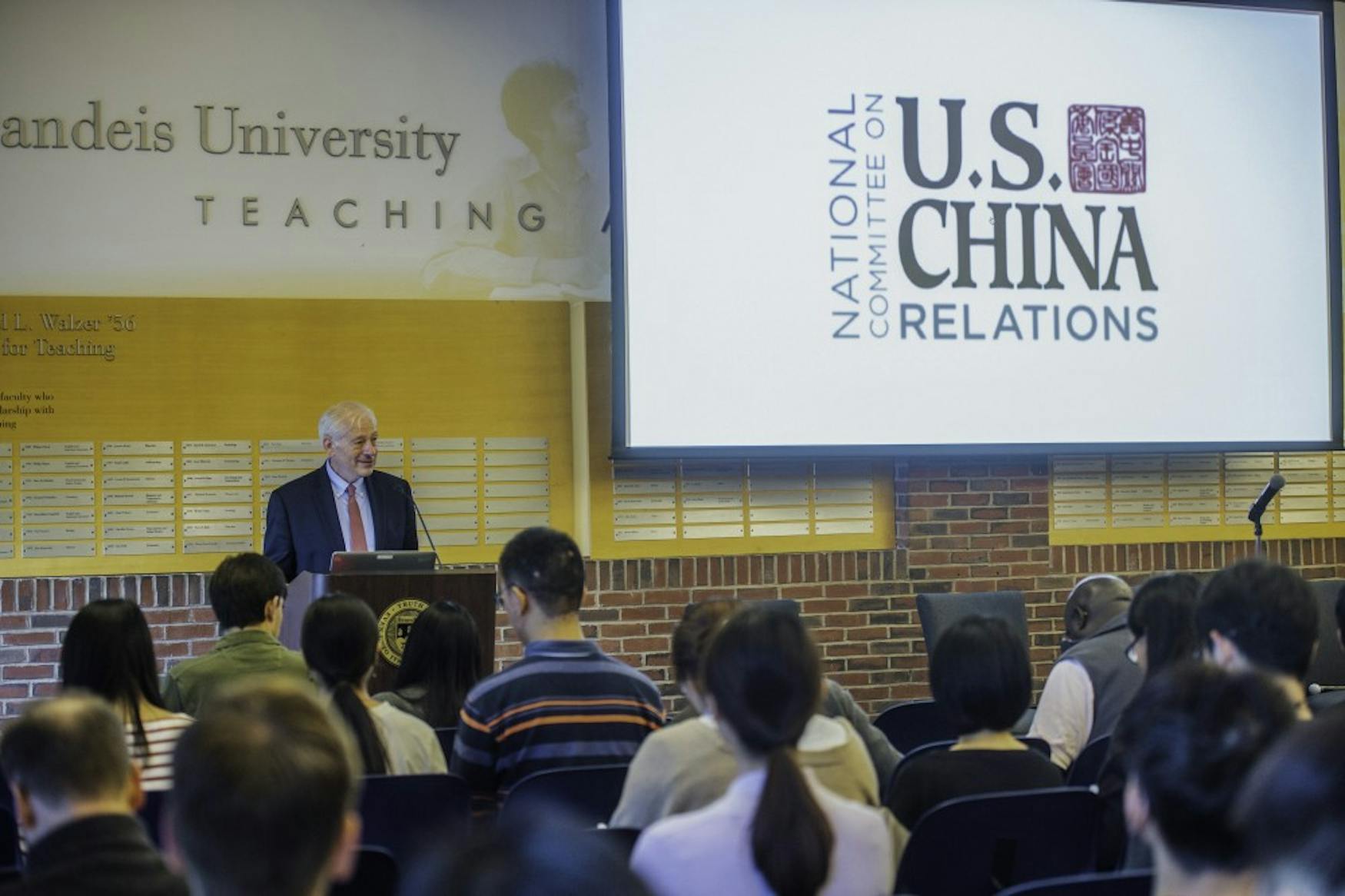Experts analyze U.S.-China relations
Students gathered in the International Lounge on Oct. 9 for a webcast with former Secretary of State Condoleezza Rice and President of the National Committee on United States-China Relations Stephen A. Orlins as well as an on-site discussion with Prof. Peter Petri (FIN) on the vital role of cooperation in the relationship between the world’s two largest economies, the United States and China. Petri began with an introductory speech on the particular relevance of U.S.-China relations to recent actions of the current administration — President Trump’s trade war with China, Vice President Mike Pence’s recent speech on China, and Secretary of State Pompeo’s visit to China.
Petri said that he believes the “darkest hour” of the U.S.-China relationship came on Oct. 4, when Vice President Mike Pence gave a speech that “sounded an awful lot like a speech from the Cold War [Era] of the 1960’s or 70’s,” for it was driven by a need to find fault with China. Petri said he finds it “scary” that the Trump administration is “really quite confused about what it wants…[and] the strategies that it is using to try to achieve what it wants” from the U.S.-China relationship. He called the current trade war with China an “escalation” of “tit-for-tat tariffs [that are] not working [and] are counter productive” and that create “long lasting resentments.” He cited the example of Secretary of State Mike Pompeo’s recent visit to China, where he was “treated very harshly,” and “probably deservedly so,” given the trade war America started. However, Petri also disagrees with the view that “this trade war isn’t working, so we better completely disengage from China.” He emphasized that the U.S.’s relationship with China is important, and we can neither allow it to sour nor ignore it.
The audience then tuned in to hear the webcasted conversation between Rice and Orlins. Orlins began by drawing attention to current tensions in the relationship between the U.S. and China. He said that the initially positive relationship between Trump and Chinese President Xi Jinping “is now being challenged,” and that after 41 years of studying U.S.-China relations, he “cannot recall a time when the future has been so uncertain.”
Orlins pointed not only to the trade war initiated by the U.S., but also the administration’s restriction of “visas for several categories of Chinese [immigrants], and [debate to end] Chinese student visas to the United States.” He also discussed China’s restrictions on American investments, appropriation of American intellectual property, and violation of international law in its “activities” in the South China Sea.
“It’s the two most important powers in the world. Cooperation between China and the United States is essential.”
With that, he introduced Condoleezza Rice. Rice said that she “considers herself a friend of China,” explaining that as a young faculty member visiting China for the first time in 1988, “The streets of Beijing were a few horse-carts, a few automobiles, and a bunch of bicycles. … That’s not Beijing today.”
She explained that China’s economy has undergone rapid growth since 1988, allowing the country to lift “hundreds of millions out of poverty” and “enter the world stage.”
In light of China’s rapid ascension, Rice emphasized the importance of maintaining and improving U.S.-China relations. She said that “the nuance in U.S.-China relations [is] to work on the cooperative elements, while trying to deal with the fact that you will have differences and being honest about those differences.”
When asked by one listener about the current trade war with China, Rice said, “I’m a free trader … I don’t like tariff back-and-forth very much. I think that it doesn’t serve anybody. I believe that the international economy is better when it is trading more openly.” She expressed disagreement with the administration’s thinking that “our only tool is tariffs.” Pointing to China’s great interest in international investment, she suggested the U.S. open its investment rules and restrictions and ask for “reciprocity.”
Reciprocity, according to Rice, is the key to better relations with China. She doesn’t believe that U.S. competition with China would hinder their relationship, though, saying, “We need to take the venom out of the word competitor.” She explained that competition needn’t be conflictual as long as the countries set “rules” for how they can compete. Her first rule was, “Let’s try to compete in a way in which we don’t take advantage of an international trading system that is supposed to be open and free.”
Another listener asked about the Trump administration’s consideration of ending Chinese student visas to the United States. Rice would be “completely opposed to doing so,” because she believes that “everybody benefits if they’re well trained” and can “improve economic life for their countries and for their people.”
Rice concluded by stressing that the U.S. must make sure China can succeed. “China is a mature economy. It’s an important economy. We need it to succeed. It will succeed better if it is more open. … Doing away with all these [trade] barriers will actually improve the prospects for the Chinese economy.”



Please note All comments are eligible for publication in The Justice.